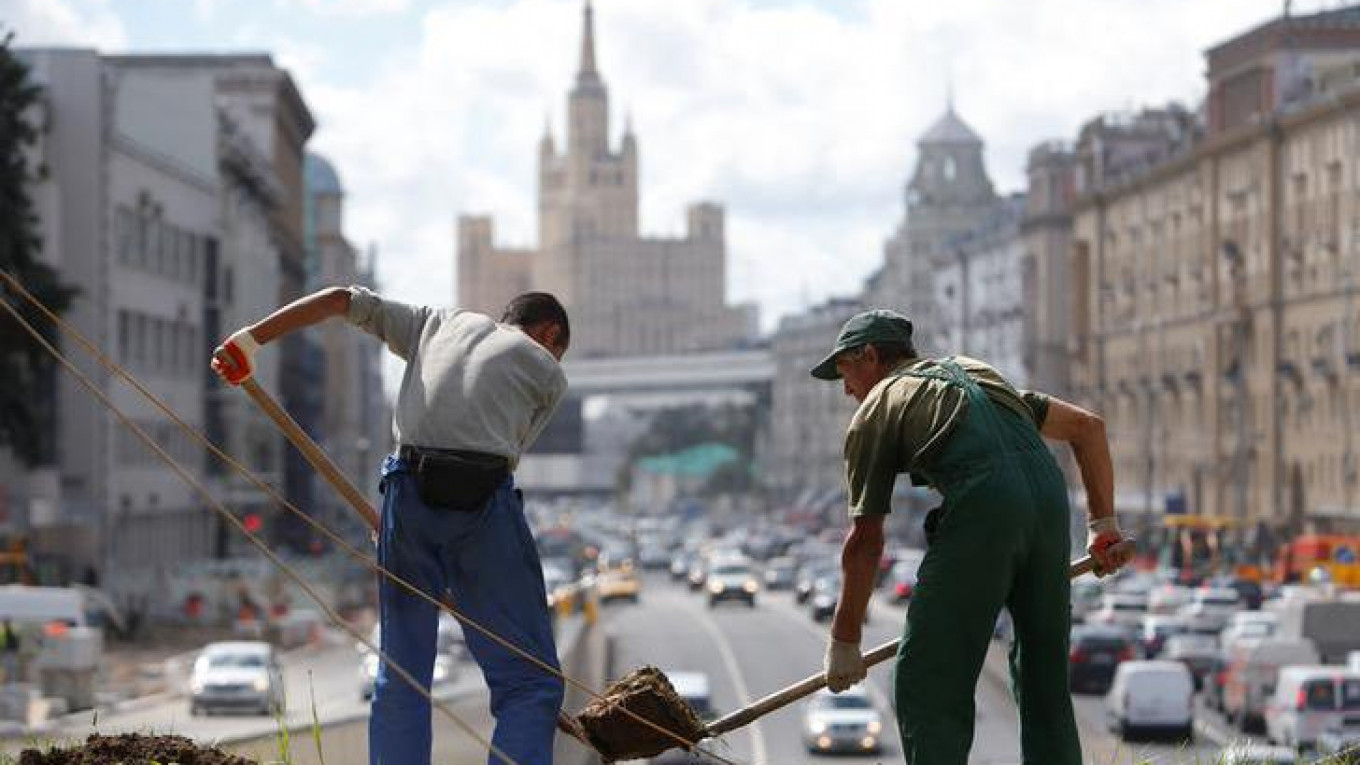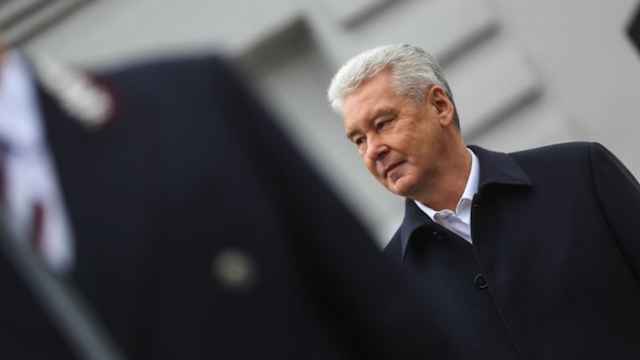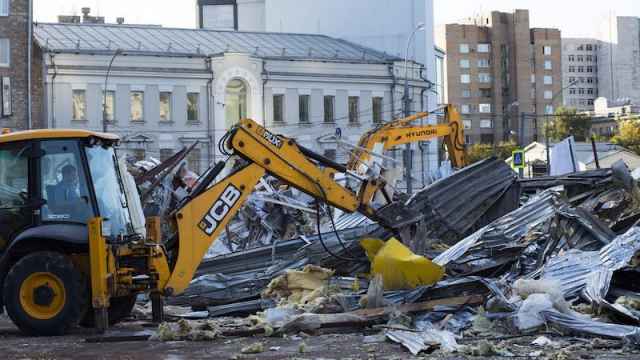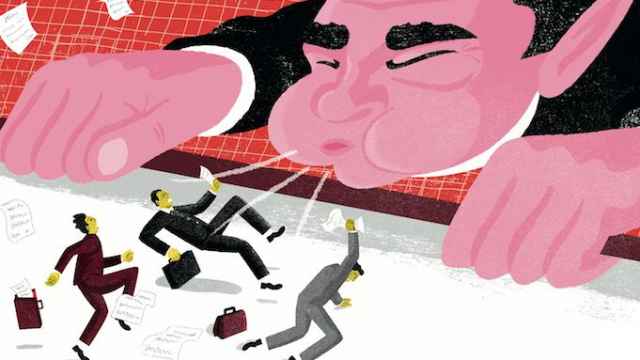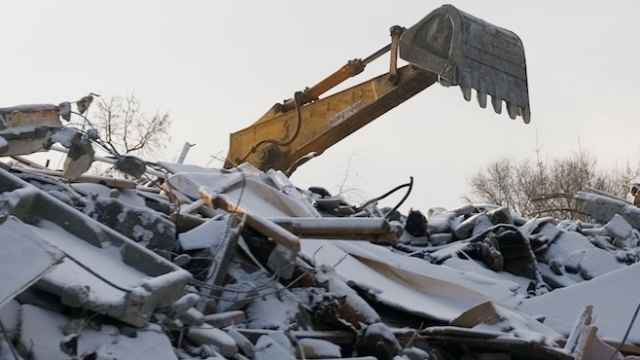The dust will have barely settled when Moscow celebrates the annual City Day on Sept. 10. City Hall has promised more than 200 free excursions around the city, most of them on foot.
Only a few weeks ago, such a tour would have been the stuff of nightmares. At the height of the summer, the capital’s center was, for the second year in a row, a huge building site. More than 50 central transport veins were cut open, to be transformed with wider sidewalks and greenery. The largest and most central roads, including the Boulevard Ring and Tverskaya Ulitsa, which leads right to the Kremlin, looked like a war-zone.
On face value, Moscow Mayor Sergei Sobyanin’s almost $2-billion monumental overhaul should have appeased Moscow’s urban creative class. In it were plans to reduce congestion and transform the city from a place for cars into one for pedestrians by 2018. Instead, the so-called urban middle class are some of its loudest opponents — criticizing Sobyanin’s plans every step of the way.
When hot weather gave way to downpours in late July, social media had a field day with pictures of submerged streets in central Moscow, blaming recent construction work for the poor drainage.
It wasn’t the first such protest against Sobyanin. Disgruntled Muscovites have criticized other changes too, including the introduction of paid parking, and, most vehemently, the demolition of small businesses around central transport hubs. The leveling of dozens of “kiosks,” — small to mid-size businesses selling everything from kebabs to phones, to groceries — under the cover of darkness, is now cuttingly referred to as the “Night of the Long Diggers.” А second wave of demolitions followed in late August.
“Not so long ago, about 10 years ago in the center of Moscow there was a kiosk in almost every courtyard selling vegetables or juice. You walk out of your apartment, and buy something,” the prominent journalist Maxim Shevchenko complained in an Ekho Moskvy broadcast.
“They want to turn Muscovites into chain-loving hamsters, a consumption society, who will have to drive somewhere in the suburbs to large supermarkets to do their shopping.”
In reality, the argument might be less about vegetables than about trust. The battle against urban renewal is personal. When former Culture Minister Sergei Kapkov helped reform Gorky Park from a Soviet-era drab amusement park into a place of trendy cafes and beach volleyball courts, he was championed by Moscow’s hipsters. Now, many of those same people are complaining about the dust clouds caused by the construction of new sidewalks or the tiles being used to build them.
Much of the frustration goes back to the 2013 mayoral elections, when Sobyanin ran against opposition politician Alexei Navalny. Though Sobyanin was a clear favorite, many still suspect the election of having been rigged in his favor to avoid a runoff.
That doubt seems to have stirred the mayor into “doing something,” says political analyst Yekaterina Schulmann. “It’s fair to assume that the new mayor would not have indulged in such an orgy of redevelopment, had he passed the test of real competition,” she says.
Meanwhile, opposition-minded Muscovites challenge Sobyanin’s legitimacy at every turn. First appointed mayor of the capital in 2010 by then-President Dmitry Medvedev, he witnessed mass anti-Putin rallies from up close the following year. His mayoral policy since is widely interpreted as the Kremlin’s response to those protests.
“It suppressed the demand for freedom, but responded positively to the demand for comfort,” wrote Alexander Baunov, of the Carnegie think tank. With their resistance to Moscow’s renewal, the liberal intelligentsia is giving Putin’s Kremlin its response, saying “you can’t buy us with new sidewalks,” according to Baunov.
Sobyanin’s former election rival, Navalny, has been a vocal critic of the mayor’s urban renewal project. Through his influential blog, he has exposed what he says are corrupt construction tenders. He claims roadworks are being repeated unnecessarily as a way for insiders, including Sobyanin’s inner circle, to syphon off more government funds. At a time of economic crisis, Navalny also argues much of the beautification is unjustifiable.
“Every one of these pieces of crap costs 2 million rubles ($31,000),” he wrote on his blog, alongside a photo of a young tree potted in a marble construction. Such decorative features now line Tverskaya Ulitsa, and have been compared to tombs by critics on social media.
But while the liberal opposition criticize City Hall, outside that bubble, Sobyanin appears to have the city’s overwhelming backing.
In a poll conducted in July by the independent pollster the Levada Center, 60 percent of residents said Moscow had become a more livable city in the past five years. Ninety-one percent of respondents were in favor of the reconstruction to pedestrianize streets. Even the controversial demolition of kiosks had the support of more than half of respondents, versus 31 percent who viewed it very negatively, says the pollster’s deputy director Alexei Grazhdankin.
Sobyanin’s personal rating is also recovering. In 2013, only 29 percent of people said they felt very positive about him, versus 43 percent this year. According to Grazhdankin, the mayor has benefited from a general change in the political atmosphere since he moved into City Hall. Following the EuroMaidan revolution in Ukraine, “many now see any form of criticism as unpatriotic.”
That view is strengthened by Sobyanin’s close relationship with the Kremlin. Before being summoned to Moscow, he was governor of Siberia, and he also worked as Putin’s chief of staff. If Sobyanin’s predecessor Yury Luzhkov was a down-to-earth symbol of the 1990s era “grab-what-you-can-while-you-can philosophy” — resulting in the mushrooming of the very kiosks that are now being leveled — Sobyanin is seen as a Soviet-style apparatchik, who does what he is told.
Not that any of that seems to hurt him. The buzz of activity surrounding his stint as Moscow chief generates a positive response, says Grazhdankin. “People think that he’s doing something, he’s active,” he says. “That’s seen as a plus in itself.”
Meanwhile, entrepreneurial Muscovites are keeping their mayor on his toes. Just a few months after Sobyanin’s authorities tore down “illegal, substandard structures,” new makeshift kiosks are already popping up in their place.
Around the corner from the now stripped-down, spruced-up metro station square at Chistiye Prudi in central Moscow, magazine and newspaper vendors are already operating from new stalls.
“Of course it’s better like this!” says a middle-aged woman, seemingly incredulous at having been asked whether or not she liked Chistiye Prudi’s new, minimalist look.
“Just give them time,” she adds. “They’ll build new kiosks to fill the space.”
A Message from The Moscow Times:
Dear readers,
We are facing unprecedented challenges. Russia's Prosecutor General's Office has designated The Moscow Times as an "undesirable" organization, criminalizing our work and putting our staff at risk of prosecution. This follows our earlier unjust labeling as a "foreign agent."
These actions are direct attempts to silence independent journalism in Russia. The authorities claim our work "discredits the decisions of the Russian leadership." We see things differently: we strive to provide accurate, unbiased reporting on Russia.
We, the journalists of The Moscow Times, refuse to be silenced. But to continue our work, we need your help.
Your support, no matter how small, makes a world of difference. If you can, please support us monthly starting from just $2. It's quick to set up, and every contribution makes a significant impact.
By supporting The Moscow Times, you're defending open, independent journalism in the face of repression. Thank you for standing with us.
Remind me later.


